The best pizza in Mogadishu
MOGADISHU, May 28, 2015 - The first time I went to Mogadishu there were soldiers on the roof of the airport terminal and a crashed cargo plane on the apron with a rocket-sized hole in its fuselage. I wore body armour pretty much all the time, was woken by explosions at night and ducked rifle fire by day.
That was five years ago. I was back again recently and went out for a pizza, at night.
Attacks in Mogadishu by Somalia’s Al-Qaeda branch, the militant group Shebab, are both bloody and common. From news reports alone you’d be forgiven for thinking the city was still mired in a Mad Max dystopia of warlords, technicals and terrorism, but you’d be wrong.
 A man loads blocks of ice onto a cart in Mogadishu on March 26, 2015 (AFP Photo / Carl de Souza)
A man loads blocks of ice onto a cart in Mogadishu on March 26, 2015 (AFP Photo / Carl de Souza)The pizza restaurant is called Karamel – with a K – and the owner, Sultan, is a garrulous bear of a man with a spade-like beard that would make any hipster envious.
New king of kings
An incorrigible pitchman, Sultan greeted me saying I was lucky to visit the best restaurant in Mogadishu. As we walked across the courtyard to our table he informed me that with Kadhafi gone Africa was in the market for a new king of kings, and that he was, of course, the best man for the job. Then he slapped me on the shoulder and laughed raucously.
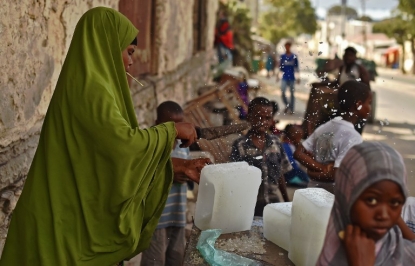 A woman cuts blocks of ice in Mogadishu on March 26, 2015 (AFP Photo / Carl de Souza)
A woman cuts blocks of ice in Mogadishu on March 26, 2015 (AFP Photo / Carl de Souza)Conversation didn't immediately flow, mainly because Sultan was distracted by every woman who sashayed across the courtyard, headscarf floating in the warm evening air. He shouted compliments on their beauty and then swiftly proposed marriage. The women, who it seemed had encountered such proposals before, reminded Sultan he already had four wives and the Koran didn't allow for more.
The very best in town
The pizzas we ate were baked in an oven Sultan had built and the cheese was imported from neighbouring Kenya. I had been reliably informed – and not just by Sultan – that they were the very best pizzas in Mogadishu. There’s not much competition, of course, but they were good, as long as you like a thick crust.
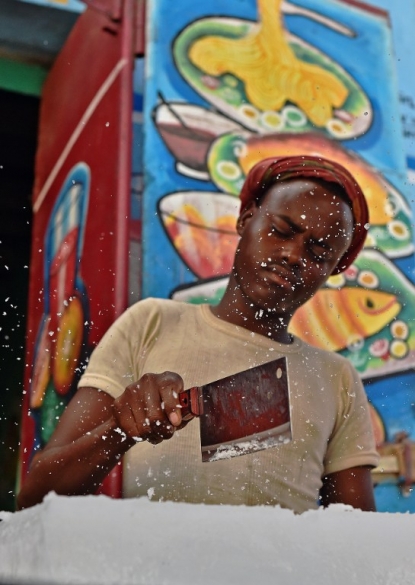 A man cuts blocks of ice in Mogadishu on March 26, 2015 (AFP Photo / Carl de Souza)
A man cuts blocks of ice in Mogadishu on March 26, 2015 (AFP Photo / Carl de Souza)I went to Karamel with a man called Bashir who during the years I’ve been visiting Mogadishu has been my friend, guide, protector and hotelier. Foreigners who come to the city and want to stay outside the bizarre expatriate ecosystem of the airport’s fortified ‘Green Zone’ often book in at Bashir’s Peace Hotel. There’s hot water, good food, cold drinks, armed guards and bulletproof cars.
Violence more elliptical
Our sampling of Mogadishu’s emerging nightlife was part of my efforts to understand how Somalia’s capital is changing as it struggles to break free from years of destructive conflict and chaos. There’s still appalling violence in Mogadishu but it is less constant, more elliptical.
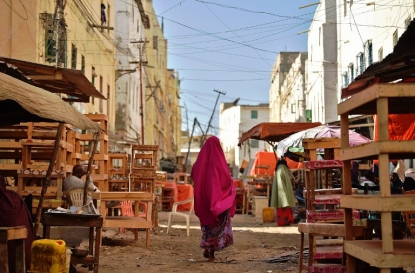 A woman walks through Hamar Weyne district in South Mogadishu on March 25, 2015 (AFP Photo / Carl de Souza)
A woman walks through Hamar Weyne district in South Mogadishu on March 25, 2015 (AFP Photo / Carl de Souza)The city’s main drag is called Maka Al-Mukarama. It’s gaudy and bustling, like the lower end of London’s Oxford Street. New high rises are going up, often clad in blue reflective glass and painted a garish salmon pink. There are electrical shops, clothes retailers, restaurants, takeaways, travel agents, banks and hotels. The dual carriageway is thick with traffic and the pavements crowded with pedestrians.
Fish-On-Head meme
In the nearby Hamar Weyne neighbourhood my photographer colleague Carl de Souza took the opportunity to get out of the car and capture some scenes of daily life, including a series of a man carrying a huge fish. The shot has become something of a meme among photographers in Somalia and a mild obsession for me, so I took advantage of the relatively relaxed atmosphere on the seafront and asked Carl to snap a memento.
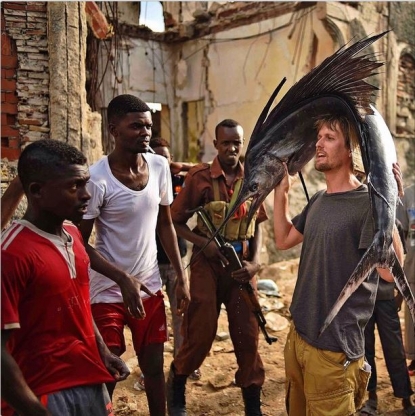
After years of seeing Mogadishu-Fish-On-The-Head photographs, Tristan McConnell tries it for himself (Carl de Souza)
Five years ago, Maka Al-Mukaram was, quite literally, the frontline.. On the roof of a building that is now a hotel I crouched behind sand bags as bullets smacked into the wall at my back. In what was to become the hotel car park there was a rough bunker for when the shells came raining down and a battery of mortar tubes for returning fire.
Blacked-out windows
Back then, I would drive around Mogadishu inside a military armoured personnel carrier or a Land Cruiser with blacked out windows and an escort of one or two pickups filled with gunmen, Bashir’s gunmen. That’s how most foreigners continue to travel even now but Bashir told me those days will soon be over.
"This isn’t the Wild West anymore and we can’t keep acting like cowboys," he said promising that next time I visit I won’t need the armed outriders, just a bodyguard. Or two. Anywhere else that might sound mob-handed but in Mogadishu it’s a big improvement.
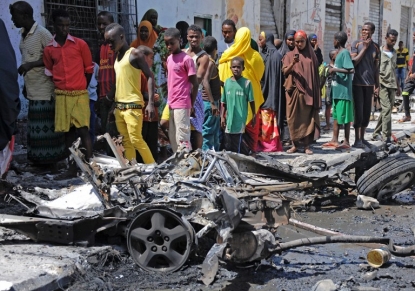 Bystanders look at the wreckage of a car bomb attack that killed three people in Mogadishu on April 21, 2015 (AFP Photo / Mohamed Abdiwahab)
Bystanders look at the wreckage of a car bomb attack that killed three people in Mogadishu on April 21, 2015 (AFP Photo / Mohamed Abdiwahab)Still, it’ll likely be quite some time before I can walk the city’s streets alone in safety. Even at Karamel, despite the attempts to show me how normal Mogadishu had become, our dinner underscored the continuing abnormality.
Time to go
Bashir called in our order in advance. We had a pick-up full of guards escort us through the city’s busy, semi-lit streets. The pizzas were served and then wolfed-down quickly.
In all, we stayed less than half an hour before Bashir decided it was time to go. A Somali journalist friend who joined us for supper sat on the edge of his chair grinning nervously as he eyed each new patron who walked into the restaurant garden. "I never relax," he said. "Never. There can be an attack or a suicide bomber can strike anytime." That night, thankfully, none did while the freedom to be out in town, after dark, enjoying dinner was unimagineable just a few years ago. Mogadishu has a long way to go, but it's come a long way too.
Tristan McConnell is an AFP correspondent based in Nairobi
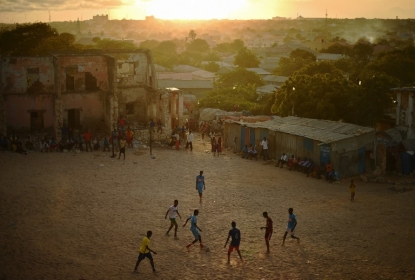 Somalis play football as the sun sets in Mogadishu on March 24, 2015 (AFP Photo / Carl de Souza)
Somalis play football as the sun sets in Mogadishu on March 24, 2015 (AFP Photo / Carl de Souza)
